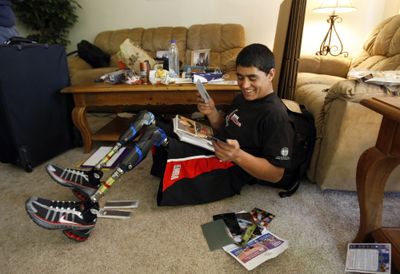Afghan’s chance trip to U.S. comes to end
Land-mine victim returns to war-torn homeland

LOMA LINDA, Calif. – As he struggled to pack more than a year’s worth of memories into a few suitcases, Mohammad Malek considered his life ahead and looked increasingly miserable.
No more surfing. No more fast food. No more wanton use of water and electricity and, of course, no more fraternization with members of the opposite sex – at least not until marriage.
“I hate it now,” he said, balancing atop a pair of artificial legs in the living room of his apartment. “I don’t want to leave.”
But his time had come to leave Loma Linda, his temporary home in Southern California.
The young Afghan, who was brought to Loma Linda University Medical Center in November 2007 after losing both legs to mine blasts in Kabul, boarded a plane Wednesday back to Afghanistan.
His return marks the end of an odyssey of pain and discovery that began in a field near the Kabul airport and ended thousands of miles away in this small city near Redlands.
Before his arrival, Malek was just another impoverished Afghan beset by war and tragedy sent out one morning to collect firewood for his family. He wandered into a field of dry brush near the airport, setting off two land mines laid years earlier by the army of the former Soviet Union.
Not long after, an American diplomat spotted him in a local hospital and was moved by his grit and determination to walk. He contacted the Loma Linda hospital, which agreed to treat Malek as a charity case.
Malek, now 19, made friends and began learning English. He enrolled at the Loma Linda Academy, a K-12 school on campus, where he impressed teachers with his intense desire to learn. Outside class, he swam and used his wheelchair to play basketball every day. Surfing became his passion. He especially liked showing off by doing headstands on the board.
“Since he came, Malek has changed from a boy to a man,” said Maranatha Hay, 24, who helped teach him English. and a bit of piano. “When I first asked him what he wanted most, he said he wanted to look people in the eye.”
That seemed a long shot back when Malek didn’t even have legs to stand on. Now he has six. A pair for sports, a set for around the house and a pair so tall he can look just about anyone in the eye – provided he doesn’t topple off first.
“He can do anything now,” said Michael Davidson, a university prosthetist who designed Malek’s legs. Davidson said he would ship replacement parts to Malek, and he has given him a tool kit to make minor repairs on his legs. The day before his flight, four friends helped Malek pack.
He was leaving a university-owned two-bedroom apartment and returning to his parent’s cinder-block house shared with eight brothers and sisters. In Kabul, electricity is sporadic, plumbing unreliable and water iffy. Worst of all, a surge in Taliban violence in and around the city has made Malek uneasy, especially given his close ties with Americans.
“I know some people might be angry with me,” he said. “I am worried about it.”
But his sunny disposition doesn’t sustain worry and fear for long. He will return to high school and start the 10th grade, the highest level anyone in his family ever reached. Then he hopes to study medicine and perhaps practice back in Loma Linda someday.
His friend David Erickson, an occupational therapist, examined a suitcase.
“That bag is so huge we could actually pack Malek in there if he didn’t have his legs on,” he said.
Malek punched him in the arm.
Another friend, Allison Hurlow, looked at a mountain of heavy, hardback books.
“Choose the books you need right away for this bag,” she told him.
He dropped in “Cities of the World,” “You’re Not Alone,” a selection of stories about amputees, and “All the Best” by former President George H.W. Bush, who met Malek and gave him a signed copy.
Malek sat down. His legs weigh 8 pounds each and exact a heavy toll on his thigh muscles. “I am looking forward to seeing my family,” he said. “I’ll miss my friends here. I’ll miss all the people who liked to talk to me. Someday I’d like to be a doctor who makes legs like mine. Maybe help people who lost legs and hands in Afghanistan.”
His face darkened a bit.
“But I will never surf again.”